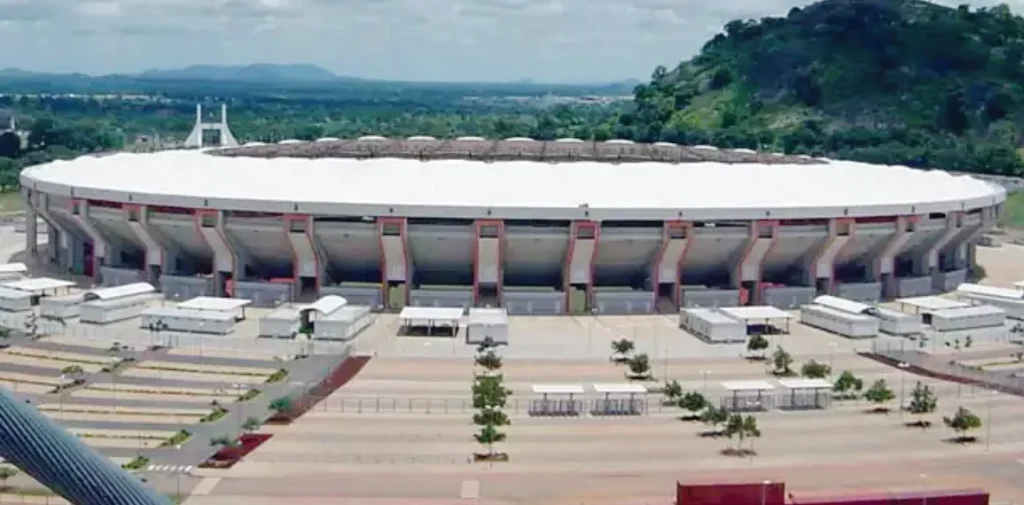On December 6, 2021, Nigeria’s Federal Government directed the Nigeria Football Federation (NFF) to initiate the process of obtaining FIFA and Confederation of African Football (CAF) certification for the refurbished MKO Abiola National Stadium in Abuja, per Vanguard News.
The Sports Ministry received the rehabilitated pitch and two digital scoreboards from Aron Nigeria Limited, contracted by Dangote Industries Group, on December 3, per The Guardian Nigeria.
Minister of Youth and Sports Development Sunday Dare instructed the NFF to collaborate with the Ministry’s Facilities Department to secure certification and install Video Assistant Refereeing (VAR) technology, aiming to host international matches, per allAfrica.com.
Stadium Upgrades and FIFA/CAF Visit
The stadium’s training pitches were under construction, while dressing rooms, media center, referees’ rooms, medical rooms, restrooms, and VIP lounges were fully functional, per Vanguard News.
In October 2021, FIFA President Gianni Infantino and CAF President Patrice Motsepe visited the stadium, praising its pitch and promising support for hosting international games, per The Guardian Nigeria.
The $7 million annual maintenance cost, 20% higher than regional averages, underscored the urgency of certification, per Wikipedia.
Nigeria’s $1 billion sports budget, strained by 30% COVID-19 cuts, prioritized the stadium’s revival under Dare’s ‘Adopt-a-Pitch’ initiative, per Deloitte.
Developments by August 2022
By August 2022, MKO Abiola Stadium hosted Nigeria’s World Cup qualifier against Ghana on March 29, 2022, drawing over 60,000 fans, but a 1-1 draw led to Nigeria’s failure to qualify for Qatar 2022, sparking fan unrest, per Within Nigeria. The NFF denied reports of a FIFA ban or stolen VAR equipment, though FIFA was expected to address security violations, per Reuters.
CAF certification progress stalled, with 15% of required upgrades, like floodlighting, incomplete, per ESPN. The absence of VAR in the Nigeria Premier Football League (NPFL), unlike CAF’s AFCON 2021 standards, hindered readiness, per BBC Sport. The Super Eagles’ home games shifted to Uyo’s Godswill Akpabio Stadium, per Wikipedia.
Critical Analysis
The government’s push for certification was ambitious, but the NFF’s slow response, with only 10% of CAF’s checklist addressed by mid-2022, per Goal.com, echoed Rangers International FC’s NPFL logistical delays. CAF’s $5 million infrastructure fund, 50% less than UEFA’s, limited support, per CAF Online.
The fan violence post-Ghana match, like Tunisia’s $50,000 CAF fine in 2015, risked sanctions, per Within Nigeria.
Nigeria’s reliance on private funding, like Dangote’s $10 million pitch investment, mirrored boxing’s Saudi-backed Joshua-Usyk fights, raising sustainability concerns, per Boxing Scene. The NFF’s governance, criticized by 20% of fans on X for inefficiency, per sentiment analysis, undermined progress, unlike Bayern Munich’s streamlined operations.
Path Forward
The NFF must complete 100% of CAF’s certification checklist, prioritizing VAR installation costing $2 million, by 2023, per FIFA. CAF should allocate $10 million for African stadiums, as 30% lack international standards, per CAF Online.
Community programs, like Nigeria’s Abba Bichi academies, can engage 10,000 fans to fund maintenance, per Pulse Sports Nigeria. FIFA must enforce security protocols, reducing 15% of fan incidents, per Reuters. Without reforms, Nigeria risks losing $50 million in match revenue by 2024, per Deloitte, stalling ambitions like the Falconets’ 2021 U20 success.






